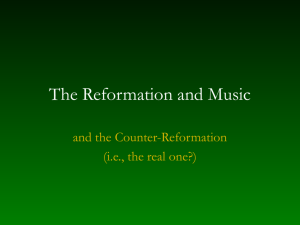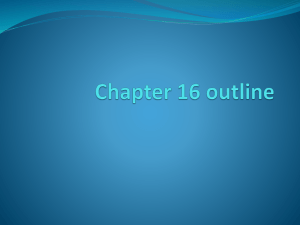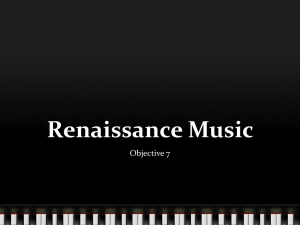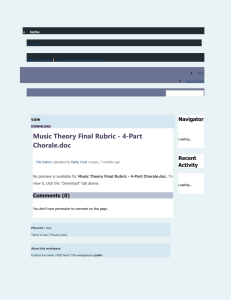1. For which composer did Martin Luther have particular... a. Machaut b. Du Fay c. Josquin
advertisement
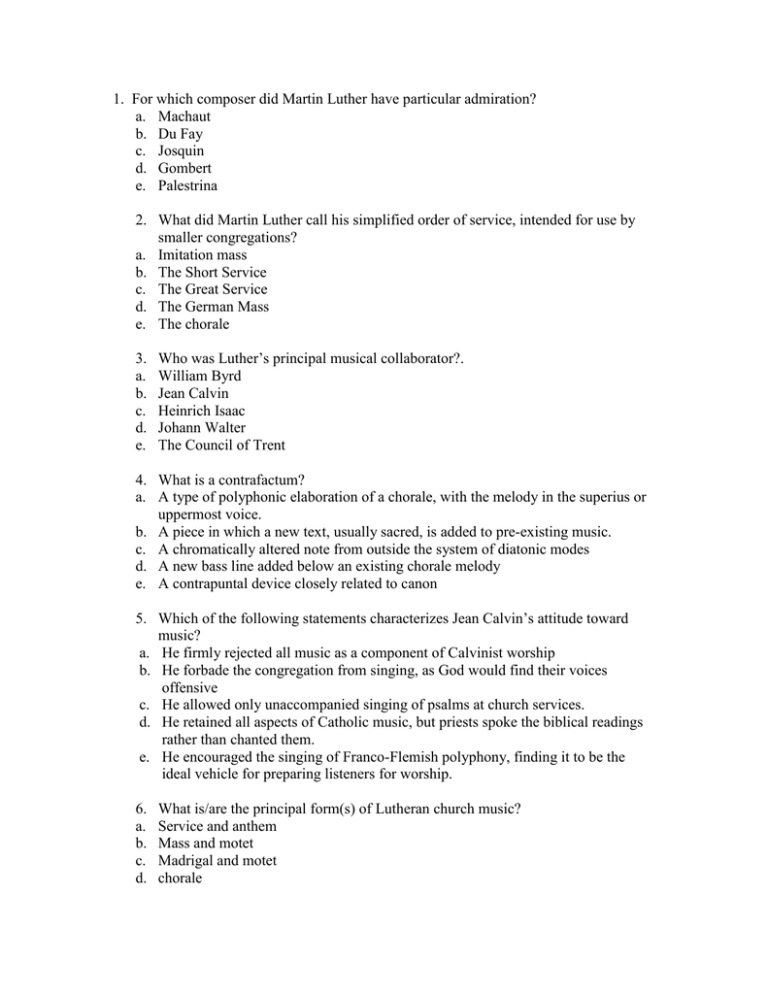
1. For which composer did Martin Luther have particular admiration? a. Machaut b. Du Fay c. Josquin d. Gombert e. Palestrina 2. What did Martin Luther call his simplified order of service, intended for use by smaller congregations? a. Imitation mass b. The Short Service c. The Great Service d. The German Mass e. The chorale 3. a. b. c. d. e. Who was Luther’s principal musical collaborator?. William Byrd Jean Calvin Heinrich Isaac Johann Walter The Council of Trent 4. What is a contrafactum? a. A type of polyphonic elaboration of a chorale, with the melody in the superius or uppermost voice. b. A piece in which a new text, usually sacred, is added to pre-existing music. c. A chromatically altered note from outside the system of diatonic modes d. A new bass line added below an existing chorale melody e. A contrapuntal device closely related to canon 5. Which of the following statements characterizes Jean Calvin’s attitude toward music? a. He firmly rejected all music as a component of Calvinist worship b. He forbade the congregation from singing, as God would find their voices offensive c. He allowed only unaccompanied singing of psalms at church services. d. He retained all aspects of Catholic music, but priests spoke the biblical readings rather than chanted them. e. He encouraged the singing of Franco-Flemish polyphony, finding it to be the ideal vehicle for preparing listeners for worship. 6. a. b. c. d. What is/are the principal form(s) of Lutheran church music? Service and anthem Mass and motet Madrigal and motet chorale e. metrical psalm 7. a. b. c. d. e. What are the principal form(s) of Calvinist church music? Service and anthem Mass and motet Madrigal and motet Chorale Metrical psalm 8. a. b. c. d. e. What is/are the principal form(s) of Anglican church music? Service and anthem Mass and motet Madrigal and motet Chorale Metrical psalm 9. a. b. c. d. e. Byrd’s music for the mass was published in_______. The Bay Psalm Book The Gradualia The Council of Trent The Medicean edition of the Gradual the Deutsche Messe 10. Who published “wholesome” polyphonic music for young people, to “rid them of their love ditties and wanton song?” a. Martin Luther b. Jean Calvin c. Henry V d. William Byrd e. The Council of Trent 11. Catholic compositions of the sixteenth century differed from earlier compositions in that_____ a. They showed no evidence of mode. b. They used the vernacular languages c. They eliminated imitative counterpoint d. There were 5 or 6 voices instead of 4 e. Composers were more free to employ dissonance 12. Adrian Willaert held the post of music director at or for________. a. The Vatican b. The Council of Trent c. St. Mark’s in Venice d. The editorial board of the Bay Psalm Book e. The bishopric of southern Germany 13. The Council of Trent__________. a. Met intermittently in a city in modern Germany b. Devoted most of its time to discussing complaints about church music c. Directed local bishops to implement reforms in church music d. Supervised the revision of the official chantbooks e. Elected Pope Marcellus, one of the great Renaissance patrons of music and the namesake of Palestrina’s Missa Papae Marcelli 14. Which of the following statements best describes the Catholic Church’s response to Protestant criticisms of its music? a. It ignored them. b. It followed all the recommendation of the reformers. c. It changed its musical practice only slightly. d. It leveled attacks against the reformer’s opinions and succeeded in changing their minds. e. It required priests to celebrate Mass in the vernacular of their congregation, but allowed monks and nuns to continue to chant in Latin within the confines of their monastic communities. 15. Palestrina spent most of his career at institutions in_______. a. Palestrina b. Naples c. Venice d. Ferrara e. Rome 16. Palestrina’s Pope Marcellus Mass is an example of which mass type? a. Tenor mass b. Motto mass c. Plainsong mass d. Imitation mass e. Free mass 17. The composer who sang in the papal chapel and quoted Josquin in his masses is _____. a. Morales b. Victoria c. Guerrero d. Lasso e. Zarlino 18. The composer who quoted his own motet in his Missa O Magnum misterium is________. a. Morales b. Victoria c. Guerrero d. Lasso e. Zarlino 19. Which of the following statements is true of Catholic music in colonial Latin America? a. Lacking money for books or instruments, priests sang Mass alone, with no choral sections. b. Missionaries brought the Spanish language as well as their religion to Latin America by translating the entire Mass into Spanish. c. Gregorian chant was sung for daily devotion in monasteries and mission, but the native inhabitants did not hear any Western music. d. The Music of Morales and other Spanish composers was sung, as well as some original compositions in native languages. e. Missionaries turned native inhabitants’ religious songs into Catholic songs through contrafacta and did not use any European music. . 20. Which statement best describes Orlando di Lasso’s career? a. He spent nearly his entire career in the region where Du Fay was trained. b. He spent nearly his entire career in Germany. c. He received his training in Hainaut, but spent his career in Italy. d. He worked for a time in Italy, but spent most of his later career in Germany. e. He spent his entire career in and around Rome, much of it in the service of the pope. SHORT ESSAYS: 1. Discuss the main similarities and differences between the Lutheran, Calvinist, and Anglican approaches to music [Use examples from NAWM to illustrate your points.] 2. For one composer discussed in this chapter, discuss the ways in which his geographical locations(s) affected his training and career. 3. Summarize the Catholic response to the pressures of Protestant reform movements in terms of musical style and philosophy. 4. Using examples from the Pope Marcellus Mass, characterize the so-called Palestrina style in terms of melody, harmony, counterpoint, dissonance treatment, texture rhythm and text setting. Terms for Identification Reformation Martin Luther German Mass Chorale Contrafactum Chorale motet Cantionale Jean Calvin Calvinism Metrical psalms Psalter Bay Psalm Book Old Hundreth Henry VIII Service; Great Service, Short Service Anthem Full anthem Verse anthem Counter-Reformation (Catholic Reformation) Jesuits Council of Trent Free mass

